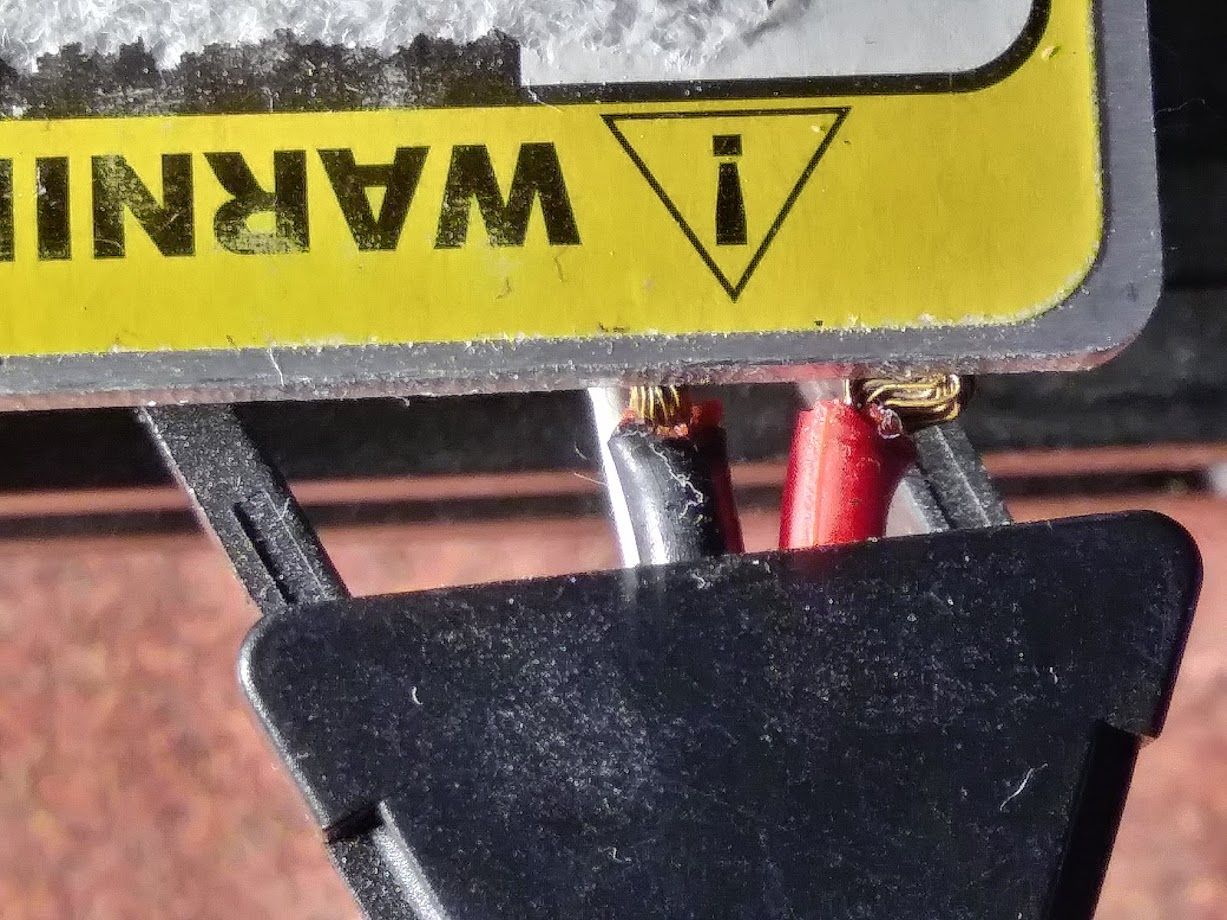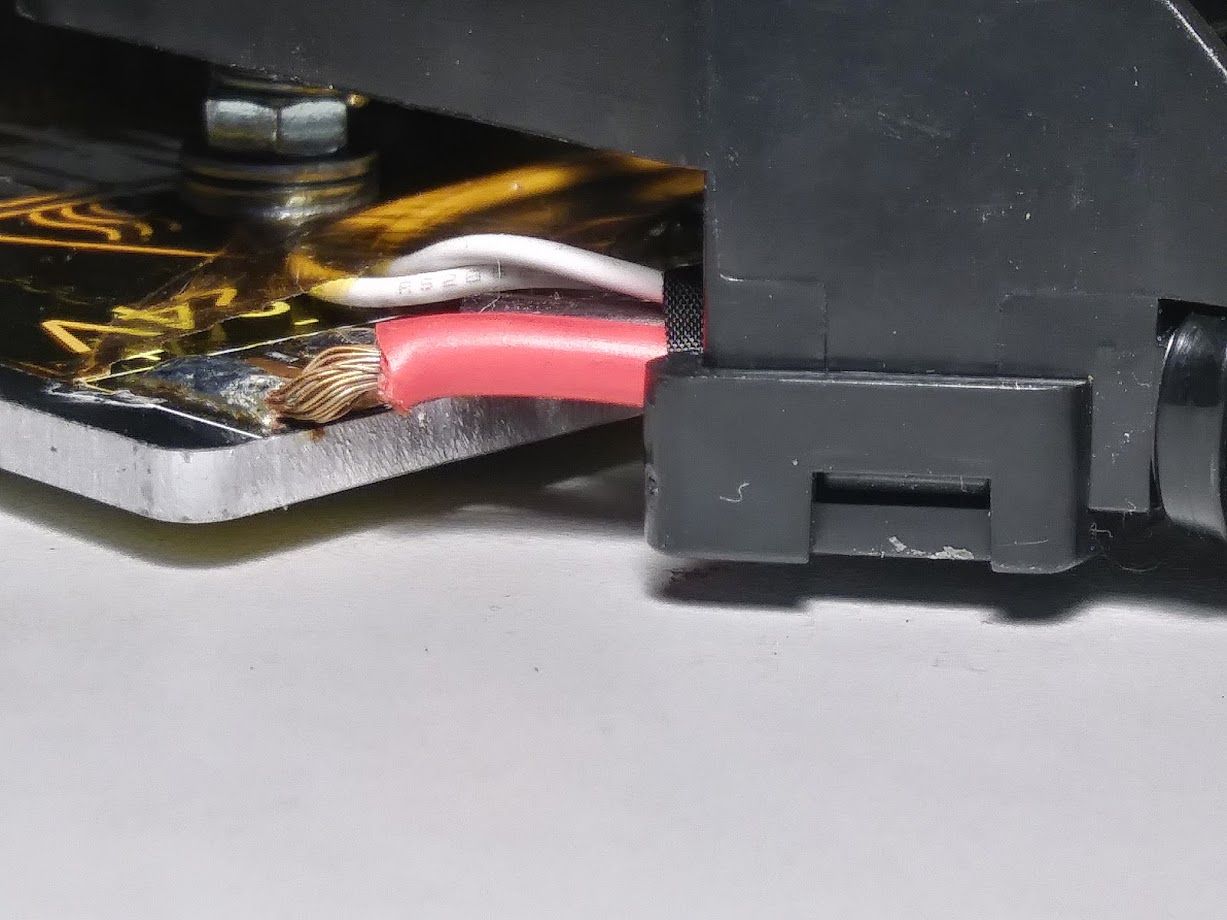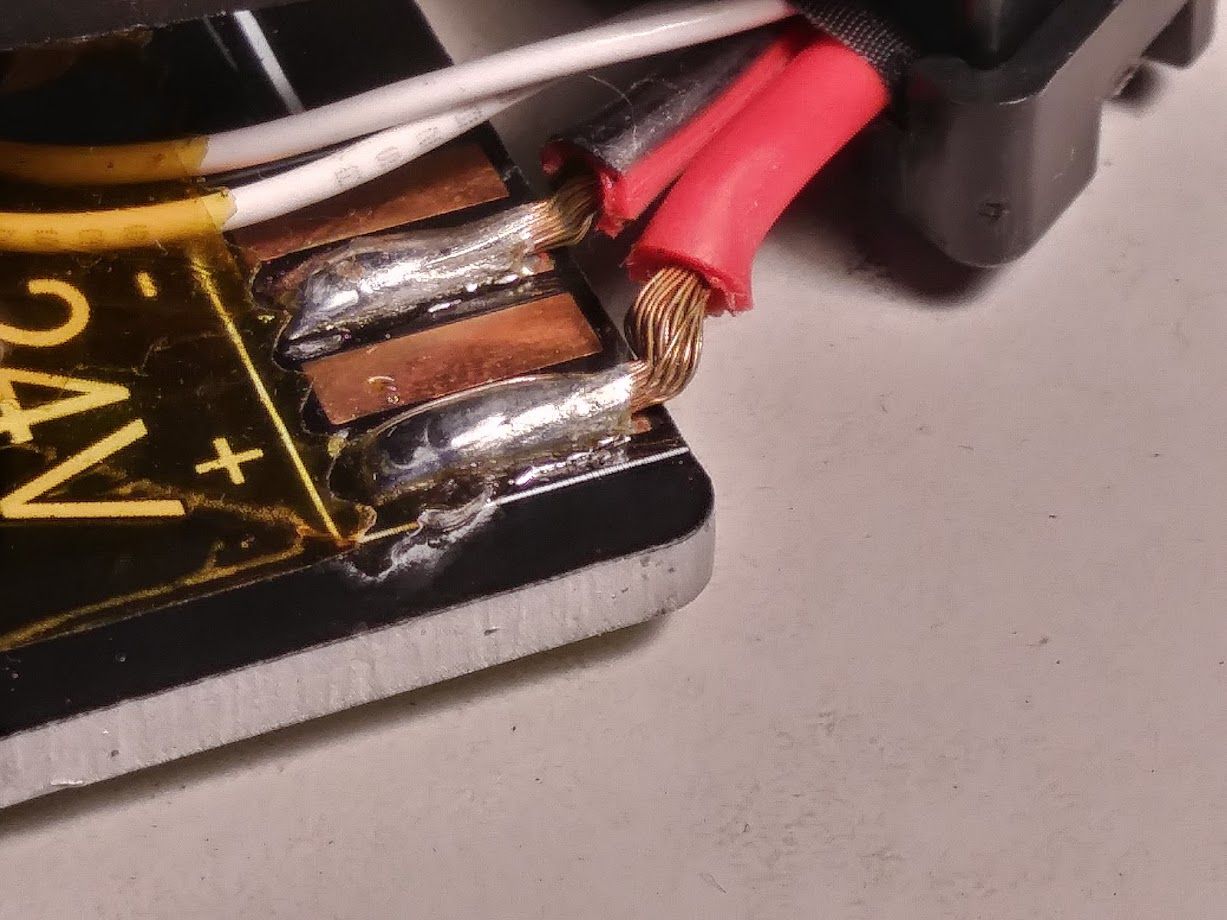Duet Maestro Bed heating uncontrolled
-
On further investigation it is fairly obvious that the wires shorted against the aluminum bed. Looking at the way this connection was set up by the manufacturer, this short seems like it was inevitable.



-
yikes

-
-
@droftarts said in Duet Maestro Bed heating uncontrolled:
@NTX9 Yikes indeed! Best check yours, @dc42 !
Ian
I will!
-
For what it is worth, I have two and the newer one is in better shape.
Is the chip next to the LED on the board, the Mosfet that has been damaged? Or is there a diagram that shows the layout of the board.
The leads on that appear substantial enough that I might brave replacing the chip.
M3d customer service is slow at best and I don't have much faith that they will warranty the board.
-
@NTX9 said in Duet Maestro Bed heating uncontrolled:
Is the chip next to the LED on the board, the Mosfet that has been damaged?
Yes, the one marked 036N04L. To replace it you will need a hotplate as well as hot air, because of the amount of heatsinking that the PCB provides.
My Quad is in better shape than your photo, but there is some bare wire very close to the edge of the aluminium. I'm going to put some Kapton tape in the gap and over the edge of the aluminum.
-
-
@droftarts
Ian, That is exactly what I plan to do. I may also add some kind of printed cover if I can find or design something that seems suitable. I am not sure how difficult re soldering will be but the alternative is to replace the bed. -
@dc42 said in Duet Maestro Bed heating uncontrolled:
Yes, the one marked 036N04L. To replace it you will need a hotplate as well as hot air, because of the amount of heatsinking that the PCB provides.
Yikes, that sounds like a golden opportunity to totally bogger up the board.
Maybe I will go with an external mosfet afterall.
Are there pins on the expansion board that would bypass the onboard mosfet? Or would I need to attach to the gate pin on the onboard mosfet?
-
While this issue is clearly the result of a short at the heated bed, it would seem like the Duet board would have a fuse to protect against this kind of fault.
-
@NTX9 said in Duet Maestro Bed heating uncontrolled:
While this issue is clearly the result of a short at the heated bed, it would seem like the Duet board would have a fuse to protect against this kind of fault.
Sadly, fuses are usually too slow to protect mosfets. OTOH, in many cases the short-circuit protection of the PSU does provide sufficient protection - but evidently not in this case.
-
Unfortunately fuses aren't fool proof; if you're looking for a warranty claim I'd look to the printer manufacturer instead.
-
@dc42 said in Duet Maestro Bed heating uncontrolled:
@NTX9 said in Duet Maestro Bed heating uncontrolled:
While this issue is clearly the result of a short at the heated bed, it would seem like the Duet board would have a fuse to protect against this kind of fault.
Sadly, fuses are usually too slow to protect mosfets. OTOH, in many cases the short-circuit protection of the PSU does provide sufficient protection - but evidently not in this case.
Even if the fuse doesn't prevent damage to the mosfet, I would hope that it would at least prevent the bed from heating uncontrolled.
-
@bearer
Unfortunately, it appears that M3D has no interest in covering this under warranty. -
@NTX9 said in Duet Maestro Bed heating uncontrolled:
Even if the fuse doesn't prevent damage to the mosfet, I would hope that it would at least prevent the bed from heating uncontrolled.
Maybe, if the short circuit lasts long enough to blow the fuse. But bed heaters should always be protected against uncontrolled heating anyway, either passively (by ensuring that the maximum temperature reached is safe), or actively (using a thermal cutout).
-
@NTX9 said in Duet Maestro Bed heating uncontrolled:
Even if the fuse doesn't prevent damage to the mosfet, I would hope that it would at least prevent the bed from heating uncontrolled.
That would have the side effect of slowing down the bed heating as well; normally the bed is on more or less 100% until it starts getting close to the set point and the power level tapers off to settle on the chosen temperature. The (electrical) fuse can't distinguish between desired and undesired heating.
A thermal fuse would be the appropriate safety device to prevent over heating in such a case, which would be part of the bed, not the controller.
It doesn't make sense to cripple a controller board because someone makes a printer that literally sh¤# the bed.
As far as the manufacturer not seeing it as a warranty claim that would be nothing but bad publicity if the product is still in its warranty period - there is no doubt the fault is poor design or manufacturing; ultimately if the warranty has expired it doesn't matter.
-
What is considered a safe maximum temperature for a 3D Pinter bed?
It seems to me that is dependent as much on the furnishings of the space around the printer as the machine itself. For example wood paneling that is common in basements or wood furniture can have spontaneous combustion at prolonged temps as low as 110c.
-
@bearer said in Duet Maestro Bed heating uncontrolled:
That would have the side effect of slowing down the bed heating as well; normally the bed is on more or less 100% until it starts getting close to the set point and the power level tapers off to settle on the chosen temperature. The (electrical) fuse can't distinguish between desired and undesired heating.
A thermal fuse would be the appropriate safety device to prevent over heating in such a case, which would be part of the bed, not the controller.
Perhaps, I am not an electrical engineer. I just know that other boards have fuses.
@bearer said in Duet Maestro Bed heating uncontrolled:
It doesn't make sense to cripple a controller board because someone makes a printer that literally sh¤# the bed.
Fair enough. From my digging around it appears that at least some of the Creality models have the exact same bed connection. And unfortunately the price point makes these some of the fastest selling printers on the market. The M3D design borrows considerably from the Creality so they possibly sourced the same manufacturer.
@bearer said in Duet Maestro Bed heating uncontrolled:
As far as the manufacturer not seeing it as a warranty claim that would be nothing but bad publicity if the product is still in its warranty period - there is no doubt the fault is poor design or manufacturing; ultimately if the warranty has expired it doesn't matter.
The printer arrived last May and the M3D warranty only covers a 3 Month period. But even if it was newer I really don't have much faith in their willingness or ability to follow through.
-
@NTX9 said in Duet Maestro Bed heating uncontrolled:
What is considered a safe maximum temperature for a 3D Pinter bed?
It seems to me that is dependent as much on the furnishings of the space around the printer as the machine itself. For example wood paneling that is common in basements or wood furniture can have spontaneous combustion at prolonged temps as low as 110c.
I agree.
My delta printer uses an AC mains voltage silicone heater on the underside of an aluminium bed, which is connected to the frame via three small metal spacers. The limiting component is the silicone heater, which is rated to 200C continuous. In my tests it tops out at 190C at full power.
Many PCB heaters struggle to reach 100C, so they are probably intrinsically safe as long as they are not supported by parts printed from PLA.
BTW hot end heaters are frequently over-powered, often sufficiently to melt the aluminium heater block at sustained full power.
-
@NTX9 said in Duet Maestro Bed heating uncontrolled:
Perhaps, I am not an electrical engineer. I just know that other boards have fuses.
they more likely than not wouldn't have helped any more than the duet fuse didn't; unless the fuse and bed are chosen to actually fail after a certain amount of time of full power which is sort of possible, but fuses aren't precise enough for it to reliable.
we also don't know if M3D changed the default bed fuse to match their chosen bed.
as far as the maxium safe bed temperature, the most relevant part is what is supporting the bed; compare to a toaster - heating filament probably reach in excess of 1000C, but mica or ceramic parts that hold the heaters can deal with the heat and isolate the outer case to avoid the surface temperature to pose a problem to the surrounding material and creatures. but there is no accounting for bad design sadly, best we can do is share the knowledge and prevent others experiencing the same.
Just get an external mosfet; file down the sharp edge and put some high temperature tape over it. if you want to bananas replace the wiring with some silicone or fiberglass insulated wires and make sure the insulation covers the edge.